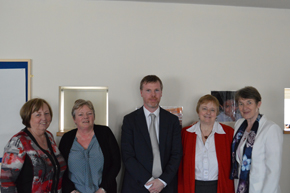September 24, 2018
Mercy Day
The 2014 Soup & Substance Lenten lunchtime talk series drew to a close on Wednesday 9 April, when Pat Zerega, Senior Director of Shareholder Advocacy at Mercy Investment Services presented ‘Using your investments for Social Change and Anti-Trafficking Initiatives’.
Pat began her lecture by explaining the work of Mercy Investment Services, the socially responsible asset management programme for the Sisters of Mercy and its ministries. Pat explained the theory of Corporate Social Responsibility, and the tools Mercy Investment Services uses to influences companies in which it owns shares. These tools include screening, impact investing, proxy voting and shareholder advocacy.
Screening, Pat explained, is the process of determining which shares a company would like to invest in and which it does not. Historically, faith based investors have avoided the ‘sin’ stocks - alcohol, tobacco, gambling and pornography. In the 1970s this was extended to include stocks in the armament industries. Pat also gave details on positive investments, which are investments in companies that are involved in socially conscious or environmentally sustainable work. Pat described how many investors are drawn to these types of companies as a result.
Proxy voting, the voting by shareholders at a company's annual general meeting, is another method used by Mercy Investment Services to achieve their goals, according to Pat. Mercy Investment Services has a policy of voting against the election of any board of directors that does not comprise one quarter women or minorities. As a result, Mercy Investment Services votes against approximately 80% of board elections in companies where they own shares, as they do not meet this quota.
Mercy Investment Services also carries out impact investing. Pat explained that impact investment occurs when investments are made into companies that may not yield a large financial return but that have the intention of generating a beneficial social or environmental impact.
Pat also highlighted the process of shareholder advocacy as a method of trying to effect change within a company. Mercy Investment Services identify a company where there is an issue, and make contact in writing. If the first contact is not successful, they issue a shareholder resolution, which are proposals submitted by shareholders to be voted on at the annual general meeting. However if the company agrees to address the issue, the resolution can be withdrawn. While Pat highlighted the benefit of shareholder resolutions, she also explained why it is better to engage with a company, as it leads to dialogue and a sharing of opinions.
 Pat spoke about human trafficking for sexual exploitation and for labour purposes, an issue that Mercy Investment Services have been working on for almost a decade. In terms of human trafficking for sexual exploitation Mercy Investment Services have approached major hotel chains in the US to ask what human rights policies they have implemented. With regards human trafficking for labour purposes, Pat discussed the supply chain reports that Mercy Investment Services have requested from a number of companies.
Pat spoke about human trafficking for sexual exploitation and for labour purposes, an issue that Mercy Investment Services have been working on for almost a decade. In terms of human trafficking for sexual exploitation Mercy Investment Services have approached major hotel chains in the US to ask what human rights policies they have implemented. With regards human trafficking for labour purposes, Pat discussed the supply chain reports that Mercy Investment Services have requested from a number of companies.
![]() Looking to the future, Pat explained how organisations such as Mercy Investment Services must be pastoral in their approach, as those people working in the firms they deal with on a Monday are the same people sitting in Church with them on Sundays.
Looking to the future, Pat explained how organisations such as Mercy Investment Services must be pastoral in their approach, as those people working in the firms they deal with on a Monday are the same people sitting in Church with them on Sundays.
Useful Websites:
Interfaith Centre on Corporate Responsibility (ICCR)
The Ecumenical Council for Corporate Responsibility (ECCR)
Messages to – Denise Boyle fmdm – Assistant Director Mercy Global Action